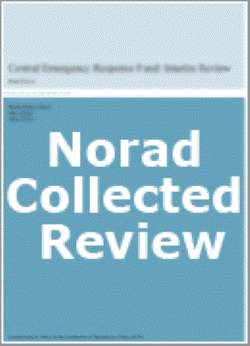Malawi Health Swap Mid-Term Review
Om publikasjonen
- Utgitt: oktober 2008
- Serie: Norad-innsamlede rapporter
- Type: --
- Utført av: Cindy Carlson, Monique Boivin, Arnold Chirwa, Simon Chirwa, Fenwick Chitalu, Geoff Hoare, Mechtild Huelsmann, Wedex Ilunga, Ken Maleta, Andrew Marsden, Tim Martineau, Chris Minett, Albert Mlambala, Friedrich von Massow, Hatib Njie, Ingvar Theo Olsen
- Bestilt av: Ministry of Health, Malawi
- Land: Malawi
- Tema: Helse
- Antall sider: Summary report: 80, Annexes: 274
- Serienummer: 22/2008
- ISBN: 978-82-7548-332-2
- ISSN: --
- Prosjektnummer: MWI 02/320

The Project
The Government of Malawi in collaboration with Development Partners finalised the six-year Programme of Work (POW) for the Health Sector in 2004. The basis for this plan was the Essential Health Package (EHP), which entails a minimum package of services to be provided free of charge at the point of delivery to all Malawians. The POW describes 6 Pillars: a) Human Resources Development; b) Pharmaceuticals and Medical Supplies, c) Essential/Basic Health Equipment, d) Infrastructure Development, e) Routine Operations at service delivery level and f) Central Operations; including policy & systems development. The POW has been implemented at the national and district level since October 2004 with financial and technical support form the Government of Malawi and Development Partners. The implementation of the POW was costed at US$ 763 million for six years. Norway has committed NOK 408 mill to the programme, and approximately NOK 200 mill has been disbursed so far.
Interesting Findings
- The Ministry of Health and its development partners took a large leap of faith in 2003 when together they agreed to move towards a sector wide approach. This move was made in full recognition of the weak capacity and weak systems within the health sector at the time. Those who signed up to the SWAp did so on the understanding that time would be needed to sort out the many problems, but also in recognition that the process of strengthening the health system had to start somewhere.
- Since the start of the SWAp, with the first tranche of funding for the Programme of Work in late 2004, improvements have been made. As far as the Pillars (ref project description above) are concerned, more health workers are being trained than ever before, and there are more staff working in health facilities. Physical infrastructure is being improved and equipment purchased and updated. New institutional arrangements, such as decentralisation and service level agreements, are shifting the locus of decision making and resources to local areas. Most importantly, there is a trend towards improvement in key health indicators.
- Much progress has been made, but there are many, many challenges left to overcome. For example, if drug and health supply procurement systems are not addressed immediately gains in EPI (immunisation), malaria prevention, HIV testing and counselling and PMTCT (mother to child transmission) will be lost and even reversed
- If steps are not taken now to address the outstanding questions on sustaining gains in human resources for health, then the situation could revert back to where it was in 2003 by 2009/2010. The Midterm Review Team received a strong sense from MOH staff and health stakeholders that the SWAp has reached a critical point in its life cycle.
- The gains seen now are the result of planning and initiatives begun two to three years ago. If strategic direction and partnership working begin to unravel now, the consequences will begin to show in less time, and achievements gained will be quickly reversed. These challenges can only be faced and responded to through coordinated and joint action between government, its development partners and its implementing partners.
